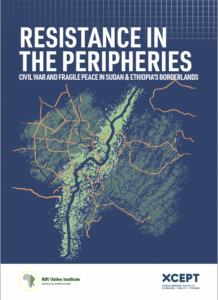Summary
• Historically, the people living along the Blue Nile – Benishangul-Gumuz borderlands in what is now Sudan and Ethiopia have been politically and socially marginalized within their respective political entities. As such they have sought ways to address this marginalization by undertaking a number of strategies. They have sought to mobilize and increase their communal solidarity and then lobby their respective political leaders, as well as use resistance as a means of self-protection and to force political concessions.
• A key aspect of these strategies has been to look to kin across the borderlands for political and military support and at the same time to seek this type of support from neighbouring governments. These dynamics have increased in intensity in recent decades as local communities have increasingly sought regional political and military support as they played off of regional inter-state tensions.
• In the 1980s and 1990s, the Sudan People’s Liberation Movement/Army (SPLM/A) acquired support from successive Ethiopian governments who were at times at odds with successive Sudanese regimes. In Ethiopia, the Gumuz and Benishangul communities have looked to allies in subsequent Sudanese regimes since the 1980s for support to their Benishangul People’s Liberation Movement (BPLM) as a means to reverse their political marginalization in Ethiopia.
• Regional support has continued to be a key strategic aspect of local strategies to address issues related to their marginalization. However, since the degree of potential support is directly related to the relationship between Sudan and Ethiopia, local communities are subject to, and constrained by, these geopolitical realities. In light of this, communities have also sought to engage directly with local government and to mobilize increased support from local communities.
• In the case of Sudan, a faction of the SPLM/A-N, led by Malik Agar, carried out a peace process with the Sudanese government in 2020-21 and then entered into government thereafter. The other SPLM/A-N faction, led by Abdelaziz al-Hilu, while still seeing strategic value in a relationship with the Ethiopian government, also sees a need to increase its political support locally in Blue Nile and is thus less beholden to the whims of the Ethiopian government. As such there is not currently a military relationship between the SPLM/A-N (al-Hilu) and the Ethiopian government.
• The BPLM, on the other hand, since 2020 has acquired increased military support from the Sudanese government, and especially its military, the Sudanese Armed Forces (SAF). This support, however, has been limited and is more likely an attempt by the SAF to extract concessions from the Ethiopian government and not solely a means to support their BPLM allies to achieve their political goals.
• By the end of 2022 the relationship between Sudan and Ethiopia was showing small signs of improvement. While this may change depending on the outcome of negotiations over contentious issues like land in the Fashaga area (Gedaref state) or the Grand Ethiopian Renaissance Dam (GERD), or a formation of a new transitional government in Sudan, communities in the borderlands will have to adjust to this new reality.
• Going forward, these communities are likely to receive less military support from regional countries and thus are likely to engage in local political negotiations with their own governments, while trying to maintain strategic relationships with regional countries.
This research paper is a product of the FCDO’s Cross-Border Conflict Evidence, Policy and Trends (XCEPT) programme, funded by UK aid from the UK government. XCEPT brings together leading experts to examine conflict-affected borderlands, how conflicts connect across borders, and the factors that shape violent and peaceful behaviour. The programme carries out research to better understand the causes and impacts of conflict in border areas and their international dimensions. It supports more effective policymaking and development programming and builds the skills of local partners.



